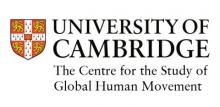
Submitted by Di Kennedy on Fri, 18/09/2020 - 09:25
|
|
The Centre for the Study of Global Human Movement Newsletter – Sept 2020 |
CONTENTS |
|||||||||
|
NEWS |
|||||||||||
|
|
New research project and film: Employing Essential Workers: Displaced Syrian Healthcare Professionals in the United Kingdom and Europe This project brings together new partners from academia, policy, politics and those working on-the-ground to build a network that seeks to address the policy and political challenges that prevent the integration and employment of displaced Syrian healthcare workers (HCWs) into labour markets in the Middle East, Europe and the United Kingdom. In our film we present the experiences of three Syrian healthcare workers who have arrived in Turkey, Germany and the UK. These countries represent the spectrum of policy approaches, political and legislative systems in which Syrian HCWs attempt to offer their much-needed experience and high-quality skills. Film link: https://youtu.be/Oyfr-fjPQJo Project lead Dr Adam Coutts from the University of Cambridge says ‘employing displaced Syrian healthcare workers is a ‘win-win’ for both host communities and refugees in terms helping to strengthen the NHS and fill service gaps exposed by the Covid-19 crisis. Employing these healthcare workers helps them move out of poverty and get on with their lives rather than just getting by. They have already been through enough trauma in escaping a war zone. In the policy to build, build, build it is a great waste to not use their skills!’ Dr Aula Abbara co-founder of the Syria Public Health Network adds ’ much more investment and policy attention needs to be given for services like the Lincolnshire Refugee Doctors Programme who provide an essential service which supports refugee doctors and speeds up the process of recertification and recruitment. In the aftermath of the Covid-19 crisis the NHS is in desperate need of their knowledge and skills’ Proudly supported by the Centre for the Study of Global Human Movement |
||||||||||
|
|
Independent Anti-Slavery Commissioner - Annual Report The latest report from the Independent Anti-Slavery Commissioner is now available for download. |
||||||||||
|
|
Fighting UK Slavery in the 2020s – New Report The newly published report ‘It Still Happens Here’ , produced in collaboration by Justice and Care and The Centre for Social Justice claims the issue of modern slavery is likely to intensify in the wake of the COVID-19 pandemic and is already costing the taxpayer many billions of pounds. |
||||||||||
|
|
Making Home Away Archive Introducing the Making Home Away archive - a free digital humanities resource for teaching on topics of migration and resettlement, centring refugee and migrant stories and linking to contemporary scholarship and creative projects tackling issues of migration. Led by Dr Yasmine Shamma, University of Reading and generously funded by the British Academy. Please see the attached pdf for full details. |
||||||||||
|
EVENTS |
|||||||||||
|
Mon Oct 5 2020 5pm – 6.30pm (BST) |
The Hostile Environment, Covid-19 and the Politics of Care by Social Scientists Against the Hostile Environment (SSAHE) During the lockdown, care of oneself, one’s family and those in the community was a central concern. The public and media championed care workers as one of the essential and key workers who enabled them to survive during the pandemic. However, care workers, both those employed in residential care homes for the elderly or looking after the elderly and disabled in households, were among some of the groups with the highest death rates from COVID-19 not just in the UK but also in the world. The effects of the pandemic on livelihoods were felt most acutely by precarious migrants (undocumented and those subject to No Recourse to Public Funds) targeted by the hostile environment. Unlike Italy and Portugal, the UK did not regularise undocumented migrants and indeed many precarious workers in households lost their jobs or had their income reduced. This webinar will analyse the consequences of the financialisation and privatisation of social care in the past 30 years and the inadequately regulated care for the elderly and the disabled, on the one hand, and poor pay and precarious conditions for many. The impact of austerity on resources devoted to care and precariousness of the labour force are likely to affect the quality of care being received. Tickets via Eventbrite: here |
||||||||||
|
9 – 18 Oct 2020 |
Journeys and Destinations Film Festival QTI Coalition of Colour is proud to present queer qandī Journeys and Destinations film fest. An online film festival with films from South West Asia and North Africa with a particular focus on the issues of movement and migration. The festival will take place on 9-18th October 2020 and free tickets will be available during this period on Eventbrite. In addition to the film screenings, there will be online panels with filmmakers, activists and scholars. To find out more about the events and the films please visit the festival page: www.queerqandi.org Proudly supported by the Centre for the Study of Global Human Movement |
||||||||||
|
|
While we finalise our event programme for the coming academic year, feel free to revisit some of our online panel events from our Global Conversations Series. Global Conversations - Technology, Remote Work and Sustainable Livelihoods for Refugees We were joined from across the globe by frontline organisations Chams, Na’amal, Re:Coded, Refugeework.net, NaTakallam as well as refugees working with them. The panelists provided an insight into the opportunities for remote sustainable digital livelihoods for refugees. We spoke to organisations that provide both the technical and soft skills for refugee remote work in the Middle East as well as provide digital livelihoods for refugees in general. Global Conversations - Refugees and migrants at the US-Mexico Border during Covid-19 We were joined from San Antonio, Texas, by Mr Isaac Bencomo, who is part of efforts aimed at delivering primary and emergency care to displaced and migrant populations in Matamoros, Tamaulipas in Mexico. We discussed the situation of refugees and migrants at the US-Mexico border, particularly at the Brownville-Matamaros complex, the impact of the Migrant Protection Protocols and the contemporary health concerns of camp populations in Matamoros in light of Covid-19. Global Conversations - Migrant Workers in the Gulf Region Mr Froilan Malit, a migration specialist at Gulf Labour Markets and Migration, joined us from Dubai for this virtual seminar where we explored the situation of migrant workers in the Gulf region. We focused on the coping and survival strategies of migrant workers during Covid-19 as well as the impact of Covid-19 on migration governance in the wider Gulf region. |
||||||||||
|
READING |
|||||||||||
|
|
Human Movement Blog Our blog is an open forum that encourages contributors and readers from all disciplines and affiliations to present and analyse ideas regarding pressing issues of migration in an accessible format. Some of our recent articles include:
If you are interested in contributing, please visit our submission guidelines at https://centreghum.com/submissions/ |
||||||||||
|
|
EU Migrant Worker Team – Blog Entries via ‘UK in a Changing Europe’ Since lockdown the EU Migrant Worker Team (www.migrantworker.cam.ac.uk) have published a series of blogs via the UK in a Changing Europe (https://ukandeu.ac.uk/) with some early research findings and bespoke pieces on various topics including, the new UK Home Office EU Settlement Scheme, Covid-19 and migrant workers and Non-EU Family Members of EU Nationals and Brexit implications. All blogs published to date can be found listed here: https://www.eumigrantworker.law.cam.ac.uk/news with a selection highlighted below.
The EU Migrant Worker Project is an ESRC-funded research project funded through the UK in a Changing Europe Programme to explore the experiences of EU migrant workers in the UK. Professor Catherine Barnard, Sarah Fraser Butlin and Fiona Costello are working together to explore the experiences of EU citizens living and working in the UK and their experiences and perceptions of Brexit. If you would like to get in touch with the project/ have any questions please do contact us. |
||||||||||
|
MEMBER PUBLICATIONS |
|
||||||||||
|
|
Campana, P. (2020), “Human Smuggling: Structure and Mechanisms”. Crime&Justice, https://doi.org/10.1086/708663 Campana, P. and Gelsthorpe, L (2020), "Choosing a Smuggler: Decision-making Among Migrants Smuggled to Europe", European Journal on Criminal Policy and Research, https://link.springer.com/article/10.1007/s10610-020-09459-y S. Maslova, S. & King, R. (2020). Residential trajectories of high-skilled transnational migrants in a global city: Exploring the housing choices of Russian and Italian professionals in London. Cities, 96, 102421. We encourage our University of Cambridge members to share their latest publications relating to human movement, migration and mobility with us. For inclusion in our next newsletter please send details to us here. |
||||||||||
|
|
|
||||||||||
|
© 2020 - The Centre for the Study of Global Human Movement
Institute of Criminology Sidgwick Avenue |
You have received this email because you are a member of the Centre for the Study of Global Human Movement or you have subscribed to our newsletter, if you wish to unsubscribe, please send an email to info@humanmovement.cam.ac.uk |
Find us: On Social Media: https://www.facebook.com/CentreGHuM https://twitter.com/CentreGHuM On our website www.humanmovement.cam.ac.uk On our blog https://centreghum.com |
|||||||||
-----------------------------------------------
The Centre for the Study of Global Human Movement
Institute of Criminology
University of Cambridge
Sidgwick Avenue
Cambridge, CB3 9DA
This email (together with any files transmitted with it) is intended only for the use of the individual(s) to whom it
is addressed. It may contain information which is confidential and/or legally privileged. If you have received this
email in error, please notify the sender by return email (or telephone) and delete the original message.
The sender has taken reasonable precautions to check for viruses but the recipient
opens this message at his or her own risk.

